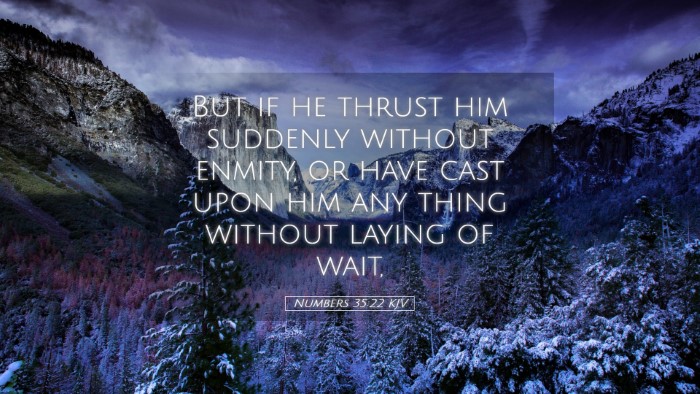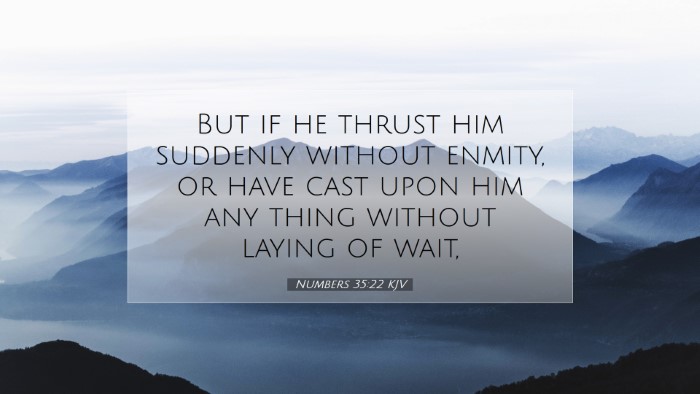Commentary on Numbers 35:22
The verse in Numbers 35:22 states, "But if he thrust him suddenly without enmity, or have cast upon him anything without laying of wait." This significant verse comes from the legislation concerning cities of refuge and unintentional manslaughter, reflecting the justice and mercy of God's laws.
Contextual Understanding
To fully appreciate this verse, it is crucial to understand its context within the Mosaic Law. The cities of refuge were designated locations where individuals who committed manslaughter could flee to escape avengers of blood and receive fair judgment. This legislation illustrated God's concern for justice tempered with mercy.
Insights from Commentators
Matthew Henry
Henry emphasizes the importance of the intentions behind actions. He asserts that the law distinguishes between intentional murder and unintentional manslaughter, underscoring the idea that God’s justice must take into account the heart and mind of the offender. He notes:
"It is not enough to avoid the act of murder; one must also avoid the thoughts and intentions that could lead one there."
This perspective reminds the reader that while actions may bear consequences, the internal motivations are equally relevant in God's eyes.
Albert Barnes
Barnes provides a detailed examination of the legal framework surrounding unintentional killing. He explains that the expression "thrust him suddenly" emphasizes the unexpected nature of the act, suggesting the absence of premeditation. Barnes states:
"God's law, while promoting justice, also makes provisions for compassion towards those who act without malice."
This point reaffirms the mercy inherent in the divine legal system, suggesting that God's law is not merely punitive but is also restorative, offering hope even for those who fail.
Adam Clarke
Clarke elaborates on the cultural implications of the verse, highlighting its relevance to ancient Israelite society. By asserting that someone could seek refuge if their act was not done with intent, Clarke reflects on the broader principle of justice that the Lord wished to instill among His people. He observes:
"The provision of cities of refuge served not only to protect the innocent but to ensure that the avenger of blood did not execute vengeance without proper cause."
This commentary emphasizes the delicate balance that the Lord maintained between justice and mercy, which is a crucial theme throughout the Scriptures.
Theological Reflections
From a theological standpoint, Numbers 35:22 speaks profoundly to the nature of sin and grace. The act of thrusting suddenly suggests a lack of control and foresight, drawing parallels to human sinfulness which often arises from impulsiveness or ignorance. Additionally, God's provision for cities of refuge symbolizes His unyielding compassion, as He provides a means of protection and rehabilitation for those who err.
Application for Pastors and Theologians
This verse remains pertinent today, as it invites followers of Christ to reflect on the importance of their intentions and actions. It challenges them to:
- Embrace a heart of mercy: Just as the cities of refuge were to protect the unintentional offender, so should the church foster an environment of grace and understanding.
- Encourage accountability: While mercy is vital, it is also essential to maintain accountability for one’s actions, promoting a balanced approach to pastoral care.
- Educate on the nature of sin: The distinction between intentional and unintentional sin offers a powerful opportunity to discuss the complexity of human morality and the need for divine grace.
Conclusion
Numbers 35:22, within its rich context, serves as a reminder of the balance between justice and mercy that God's law embodies. As spiritual leaders and scholars reflect on this passage, they are encouraged to apply its principles in fostering a community that not only upholds righteousness but also extends grace, understanding, and restoration. The invitation to recognize our vulnerabilities and sail towards the refuge of God's mercy is a core message that transcends time, offering hope to all who seek Him.


